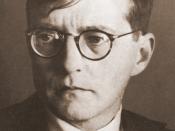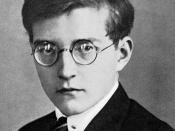On the 8th of September 1941 the Germans began their attack on the city of Leningrad. During this time the citizens of the city were virtually cut off from the world. It lasted for about 900 days, from September 8, 1941 till January 27, 1944. All the citizens of Leningrad united and grouped together in hope of a quick defeat of the Germans, and a wave of patriotism spread through out the city. The radio played a very important role in keeping the flow of the feeling. Many people used this form of communication as a method of hope, one that would announce the defeat of the Germans; the broadcasts were used to boast the morale of the people of the USSR. Also the newspapers took on the same role as a radio; however unlike the radio their main aim was to increase patriotism and nationalism. Lots of articles were published glorifying Soviet victories.
Songs also became a type of propaganda for the people. For example Dmitri Shostakovich played his Seventh Symphony. However he said that "it's not about Leningrad under siege, it's about the Leningrad that Stalin destroyed and that Hitler nearly finished off".
In this blockade Hitler concentrated on trying to starve the people out of the city. By the end it was estimated that there were about 670,000 deaths from 1941 to January 1944, mostly from starvation and cold. From other sources it was estimated that actually from 700,000 to 1.5 million people died. By the winter of 1941-42 there was no heating, no water supply, almost no electricity and very little food. On September 2 the food-stuffs consumption was reduced: the workers had 600 grams of bread daily, employees- 400, children and dependants- 300. And then in January 1942, the lowest food rations in the...



Lots of info.
Trouble is, not much critical analysis or organisation into an essay form. You mention the hell these people went through and then decided to simply end by suggesting that after a miracle the siege was lifted. The end.
0 out of 0 people found this comment useful.